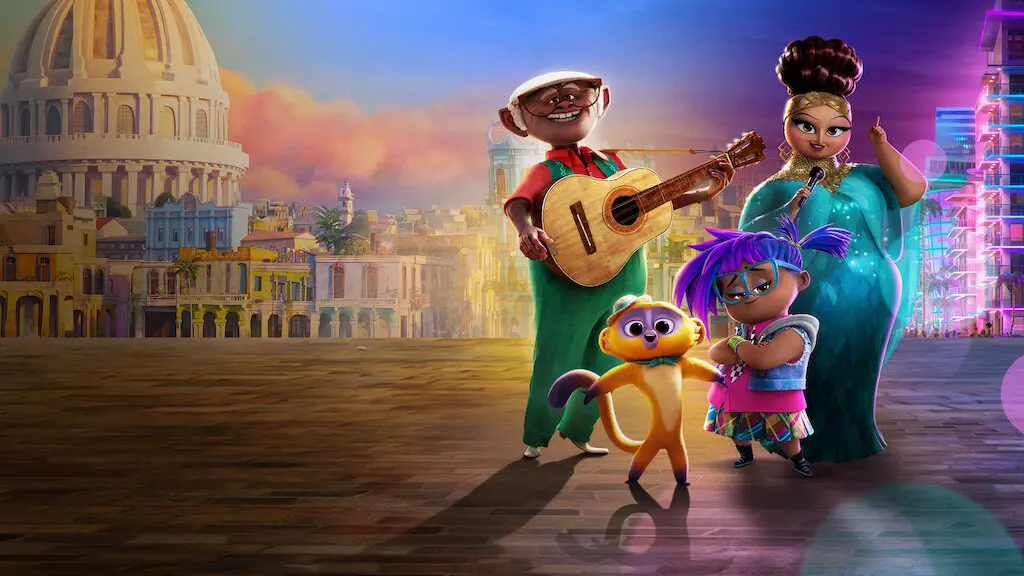Summary
Vivo may not be Lin-Manuel Miranda’s best, or even Sony Animation’s best, but its message, music, and inclusivity make it an essential watch.
This review of the Netflix film Vivo does not contain spoilers.
Leave it to Lin-Manuel Miranda to make the kinkajou mainstream. Despite sounding like the name of a second-generation Pokémon, it’s actually the name of the tropical mammal at the forefront of Sony Animation’s latest animated venture — and its first-ever animated musical — with Netflix, Vivo.
The film starts with the titular creature performing on the streets of Cuba with his elderly owner Andrés, a talented musician in his own right. When a former flame turned international superstar, Marta Sandoval, invites him to perform at a concert with her overseas in Florida, Andrés packs his bags without hesitation.
Years prior, Andrés had written a song for Marta. In it, he expressed his true feelings for her, yet never gave it to her out of fear that she would stay with him and not follow through with her dreams. While reluctant at first, Vivo ultimately warms up to the idea to support his dear friend. However, when Andrés suddenly passes away, Vivo takes it upon himself to deliver that song and the message that Marta never knew. Along the way, he encounters several new friends including Andrés’ grand-niece Gabi, two clumsy roseate spoonbills, and some wild and well-intentioned girl scouts.
There are many things to love about this film. Overall, I enjoyed the animation, the music, the humor, and the message. However, the film’s setting is easily my favorite aspect. While the film starts off in the South Caribbean country of Cuba, most of it takes place in Florida. Even though the film is confined to a small corner of the globe, thanks to the various geographic landscapes the state has to offer it still feels like an international adventure. I know it probably sounds like a silly thing to appreciate, but a story like this could have gotten stale very quickly, and the setting ensures that the characters stay on their toes constantly. Plus, like the rest of Sony’s animation, it’s always beautiful to take in.
Although I wouldn’t say it’s the best work that Sony’s done, it is up there with another one of the company’s gems this year, The Mitchells vs. The Machines. Director Kirk DeMicco, who previously helmed The Croods, takes a lot of really cool liberties in the film, breaking the rules of traditional animation and incorporating a lot of fantastical elements, especially during its musical numbers. The result elevates the audience and makes them feel as joyous as Vivo is performing.
While arguably repetitive of some of his previous works, Miranda’s musical contributions are also a memorable part of the film. He wrote 11 original songs for it. Even though I don’t think all of them are bangers, there are some really great ones. The performances that he and the rest of the cast carry the songs through are ultimately what makes them all enjoyable.
The best performance by far in the film is that of newcomer Ynairaly Simo. She plays Andrés’ niece Gabi, and she pretty much steals the show. Vivo certainly gets all the cute moments and the best songs, but Gabi gets the more emotional ones and funniest dialogue.
Now, although the movie is really entertaining and filled with so many great moments, it did fall flat at times. For example, I found the film’s penultimate musical number — which the entire thing kind of builds up to — to be one of the weaker songs. Additionally, there are some subplots that feel a bit too tacked on. One prime example of this is Gabi’s mom’s whole arc. Throughout the film, she searches the city to try and prevent Gabi from going to the concert. Despite a wildly different motivation here, it felt to me very derivative of similar plotlines in other animated films. More specifically, I think Onward executed that subplot a bit better.
Overall, this film still delivers. Its message about the power of love, even after life, is unparalleled. Not only does it deliver in terms of entertainment too, but it also delivers with its representation. Miranda may have gotten a lot of backlash for the lack of representation in his last film In the Heights, but that’s not the case here. I recall covering Sony’s Wish Dragon a few months ago, and talking about how even though it was a so-so film people would still be able to resonate with it on a personal level because the characters feel like real people. The same goes for Vivo.
Being a person of Cuban descent myself, I can especially vouch for that. As if seeing the flag and hearing the language wasn’t enough, many of the characters in this film including Andrés and Gabi felt like members of my own family. So while it may not be perfect, it’s still important. What Vivo lacks in story, it makes up for in its message, music, and inclusivity.
What did you think of the Netflix film Vivo? Comment below.




